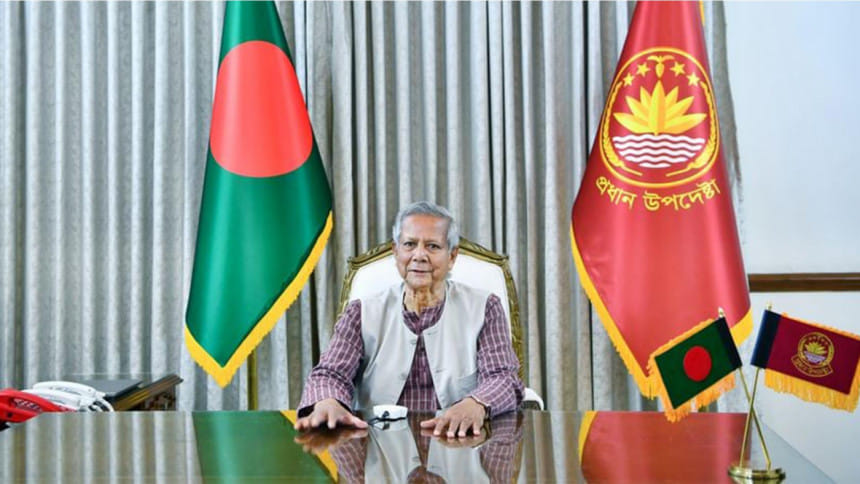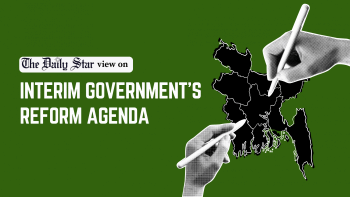From vision to action: Prof Yunus’s reform agenda for Bangladesh

Prof Muhammad Yunus's transition from Nobel laureate to reformist chief adviser continues to capture the nation's attention. In his August 25 speech, Yunus outlined an ambitious vision for a "new Bangladesh" centred on unity, transparency, and democratic renewal. While his message resonated with many, it also left citizens asking: "Can he turn words into action?" Fast forward to September 11, and Yunus seems determined to answer that question. His latest address laid out specific reforms, marking the beginning of a long journey toward real change.
Diplomacy and governance today go far beyond traditional bureaucratic processes, and Prof Yunus stands at the forefront of this shift. Through Grameen Bank, he demonstrated how NGOs can drive powerful social and economic change where governments often struggle. This blend of engineering diplomacy—using pragmatic, principled solutions paired with negotiation—is a skill Yunus and the IG can now bring to create a new Bangladesh.
However, running a government, unlike an NGO, is a different challenge. It requires navigating political complexities, balancing competing interests, and making compromises that NGOs can often avoid. While his outsider perspective and grassroots experience offer fresh ideas, Yunus and the IG must be cautious not to fall into the political traps that can derail even the most well-intentioned leaders.
Politics requires balancing various factions, managing entrenched bureaucracies and interest groups, and dealing with opposition parties. The IG must ensure that reforms are not seen as bypassing democratic processes or alienating key political actors. The IG's ability to lead will depend on their skill in coalition-building and maintaining legitimacy in the eyes of both political elites and the public. Members of the IG need to be cautious about becoming entangled in the very political games they seek to transcend—where loyalty, political capital, and power dynamics can overshadow the principled pragmatism they aspire to attain. For the IG, the key lies in harnessing the strengths of modern engineering diplomacy while staying grounded in the political realities of governance. They must strike a delicate balance between being innovative reformers and astute politicians, ensuring that the vision of a new Bangladesh can survive the political process without being compromised by it.
In his August 25 speech, Prof Yunus's metaphor of the nation as a family resonated widely. The idea was simple yet powerful: Bangladesh must come together as one to heal from years of corruption and mismanagement. However, as the days passed, some began to wonder if this metaphor oversimplified the challenges that lay ahead. Calls for unity, while necessary, are not enough to address the deep structural flaws embedded in the country's political and economic systems.
In his September 11 speech, Prof Yunus pivoted from this metaphorical language to concrete steps. He announced the formation of six commissions aimed at addressing fundamental sectors—electoral system, police, judiciary, anti-corruption, public administration, and constitutional reform. This shift from a unifying metaphor to specific structural reforms is crucial. It signals a move from aspirational rhetoric to actionable governance.
In my previous article, I noted that the public had received Yunus's initial speech with optimism, but also caution. Many were asking, "Can he deliver?" This scepticism was not unwarranted, especially in a country where promises of reform have often been marred by inefficiency and corruption. Yunus responded directly to this scepticism in his September 11 speech by providing a clear roadmap for his reforms. The six commissions represent a pragmatic approach to institutional reform, offering a structured and transparent process for addressing corruption, inefficiency, and structural flaws. The commissions are not just symbolic gestures—they are tasked with delivering results within three months, after which consultations with political parties, students, and civil society will take place.
While Prof Yunus's move toward structured reform is promising, significant challenges remain. The timeline for the commissions—just three months—raises concerns about whether there will be enough time for thorough analysis and genuine consultation. The success of these efforts hinges on the cooperation of entrenched political and bureaucratic forces, many of whom have thrived in the current system.
A critical issue is the lack of representation from ordinary citizens. Despite the student-public-led uprising that ousted the previous regime, decision-making remains concentrated among the educated elites and privileged classes, with limited input from the broader public. To avoid past regime failures, the IG must include all relevant stakeholders. This means going beyond the elites to include voices from four key groups: the knowledge community, the political community, the resource community, and most importantly, the affected community.
As I discussed in an earlier piece, genuine reform would require a collective effort of all stakeholder groups. The affected community, in particular—those directly impacted by decisions—cannot be sidelined. Their involvement is crucial for creating reforms that are not only theoretically sound but also practical and just. If the IG fails to include these diverse voices, there's a real risk of falling into the same elitist traps the uprising sought to dismantle. Prof Yunus has signalled the need for inclusivity, reflecting the ideals that emerged from the student-public uprising, but translating this vision into reality will be the true test. Rebuilding trust in the nation's institutions is possible, but only if the reforms produce tangible results that reflect the input of all four stakeholder communities.
Over the past month, the IG has made several key decisions shaping Bangladesh's future. While some decisions may have sparked debate, there is widespread support for most of the IG's initiatives. However, one decision that has raised serious concerns is the appointment of Tajul Islam as chief prosecutor of the International Crimes Tribunal (ICT). Many view this choice as highly problematic, given his past association with the defence of Jamaat-e-Islami leaders convicted in controversial trials at the ICT. Critics argue that this appointment signals a potential return to politicised justice rather than a commitment to fair and independent trials, undermining the very goals of reform the IG aims to achieve. If the IG is to maintain the public's trust and avoid the pitfalls of past regimes, it must ensure appointments reflect the principles of impartiality, accountability, and fairness.
Earlier, I likened this journey to the metaphorical road from Tetulia to Teknaf—a long path toward democratic and institutional reform. The September speech has laid the groundwork, with the commissions as the vehicles to move forward. However, the real challenge isn't just starting the journey; it's staying the course. The IG has set Bangladesh on the right path, but success will depend on sustained public engagement, transparency, and a commitment to long-term change.
Prof Yunus's September 11 speech marks a critical step in turning vision into reality. The challenges ahead are immense, but the potential for meaningful reform is unprecedented. Now, the IG must fulfil its promises, ensuring that the journey from Tetulia to Teknaf becomes a genuine transformation for the people of Bangladesh. This transformation must balance nyay (ideal justice) and niti (procedural justice). While nyay sets the values, niti ensures practical execution. As we move forward, autonomy, inclusivity, accountability, and justice should guide our government toward a more just and equitable future.
Shafiqul Islam is director of Water Diplomacy, and professor of civil and environmental engineering and water diplomacy at the Fletcher School of Law and Diplomacy at Tufts University, US.
Views expressed in this article are the author's own.
Follow The Daily Star Opinion on Facebook for the latest opinions, commentaries and analyses by experts and professionals. To contribute your article or letter to The Daily Star Opinion, see our guidelines for submission.

 For all latest news, follow The Daily Star's Google News channel.
For all latest news, follow The Daily Star's Google News channel. 










Comments